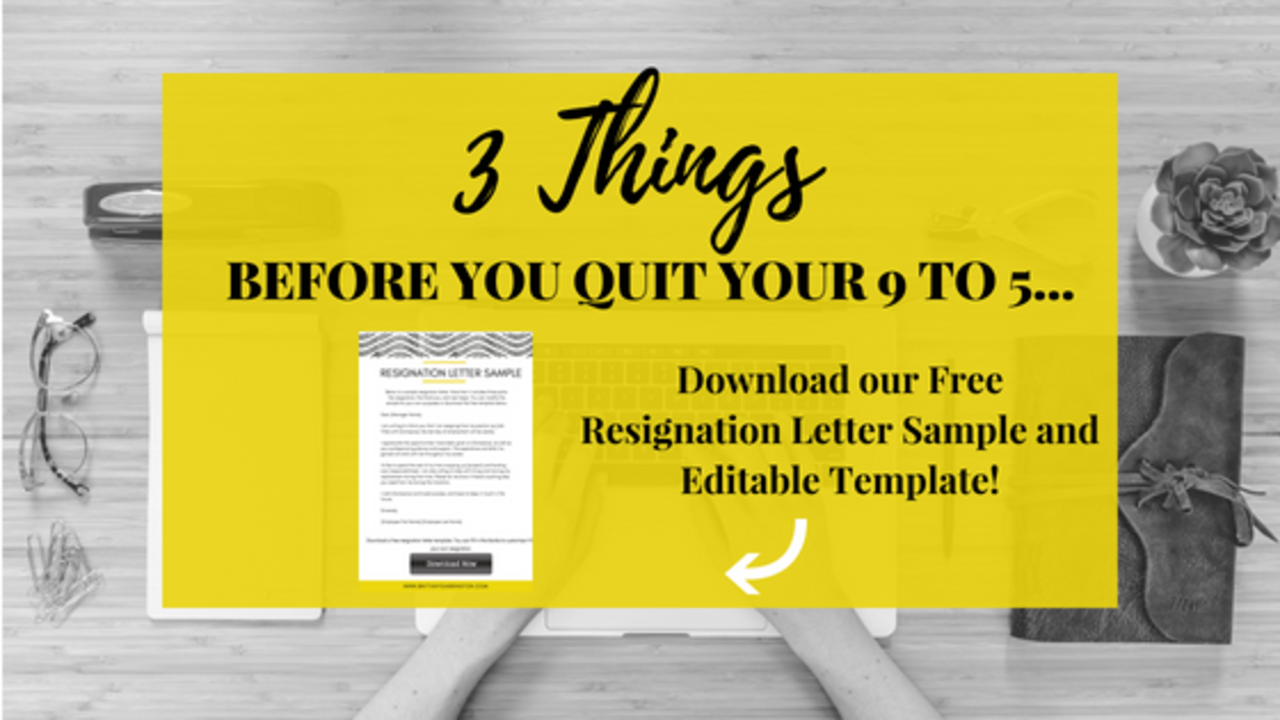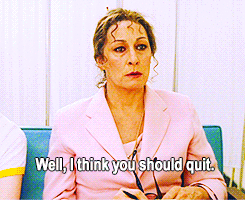3 Things Before You Quit Your 9-5

While quitting your day job to pursue full-time entrepreneurship seems like #TheDream, it’s not nearly as glam once you take the leap. In most cases, resigning is an exciting but scary experience.
Regular employment provides more than just a regular paycheck. It provides a network of relationships and opportunities. Fortunately, you don’t have to give those things up.
By resigning professionally, you can make sure you don’t close any doors or sour any relationships. In this post, I'll cover how to do just that.
Get Your Ducks in a Row

Resigning from your job, especially a good one, isn’t a decision to make suddenly. Many people spend years building their business on the side before taking the leap. Only you know when you’re ready to leave your full-time job behind.
Before you take the plunge, there are a few things to consider.
#1 Line Up Your Savings
First, do you have a plan?
No, not just a strategic business and marketing plan, although that’s important too. I’m talking about a full, unbiased analysis of your current financial situation.
Do you have any savings to fall back on? Being a successful entrepreneur is about balancing risk with reward. You can remove some of the risks if you have money in the bank to get you through the hard times. Even very successful businesses sometimes run into cash flow shortfalls, so make sure you can cover your personal expenses if you don’t get paid for a while.
Whether you’re starting up or scaling up, you need to plan for how things will change once you commit to your business full-time. What additional responsibility will you be taking on? How will you grow? If your business doesn’t grow, you may regret leaving your old job behind. Have a plan to make sure it does.
#2 Prepare for a Lifestyle Change
Things are going to be different when you’re working for yourself. And that’s ok. Great actually. You’ll have more freedom and the control to work how you want, where you want, and when you want. This includes control over your own compensation package.
Do you have unused vacation days? Use them up before you go. You may not get another chance to take time off for a while.
Do you rely on company health care benefits? Get your own plan lined up before you let go.
Can you work at home or do you need an office away from home? Don’t forget to account for the cost of a workspace.
Are you willing and able to hold yourself accountable for getting things done? You have to be your own boss now.
#3 How To Resign Professionally

When you resign from your job, it is important that you follow proper resignation etiquette. How you leave your job can impact your future relationships. If you maintain a positive, professional relationship with your former employer and your colleagues, you are more likely to get positive references, helpful networking advice, and more.
It doesn’t matter what your relationship with your employer is. Whether it's awesome or awful, don’t ruin it. You never know when you’ll run into people in the future when they could help—or harm—you. Keep things friendly.
When resigning, give resignation notice to your employer ahead of time, write a simple resignation letter, and then say goodbye to your colleagues.
It's good resignation etiquette to tell your supervisor you are resigning before you tell your co-workers. You don't want the company to discover that you're quitting through the grapevine.
However, just because you give notice doesn’t mean your employer will accept it. It is within their rights to terminate your role immediately and some employers prefer not to have people around after they’ve resigned. Be prepared for this outcome.
Also, plan your limits ahead of time. How involved will you be in finishing up projects, handing over responsibilities, and hiring and training your replacement? Decide on this ahead of time so that you don’t over-promise or let your employer down.
Do
✔️Give at least two weeks’ notice and — if your schedule allows — offer to work longer to create a smooth and orderly transition
✔️Collaborate with your boss to figure out the best use of your remaining days and how you should tie up loose ends
✔️Be thankful for what you learned at your job and openly express gratitude to colleagues
Don’t
✖️Give different reasons to different people — stick to one story about why you’re leaving
✖️Be dishonest or overly secretive about your next move — your boss and former colleagues will find out where you’ve landed soon enough
✖️Divulge too much during your exit interview — it’s not the time to give detailed feedback and ideas for improvement
What Happens Next
After you submit your letter of resignation, your boss may want to chat with you. Especially if they didn’t see it coming. At this point, you may want to discuss more of your reasons, such as wanting to focus on your own business—but you’re not obligated to.
Excellent! Now it’s time to create an exit plan. This is where everything becomes much more real.
That’s it. It’s a big, sometimes scary, step, but you’re moving on to better things. Best of luck with your next opportunity. If you’re resigning to start or grow your own business, subscribe to this blog for great tips and advice.
Have you quit your job to become a full-time entrepreneur? Brag about it in the comments!



